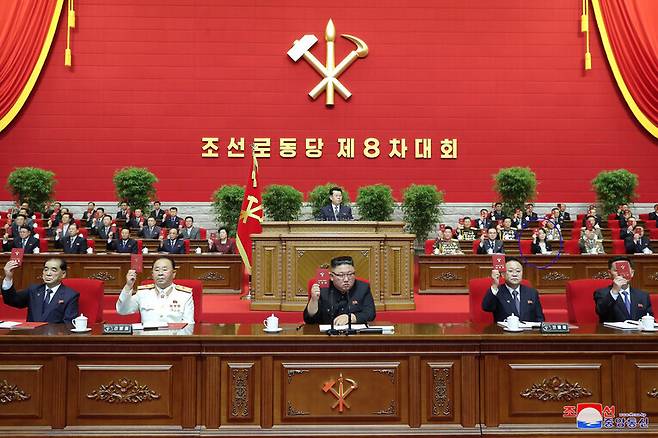Kim Jong-un acknowledges N. Korea's failure to achieve economic target in WPK Congress speech
전체 맥락을 이해하기 위해서는 본문 보기를 권장합니다.
Judging solely from his speech, Kim has not sought to echo the North's traditional rhetoric by blaming the economic failure on "the US empire and South Korea's hostile policies to isolate and eradicate" North Korea. While he referred to "various external and internal challenges that hamper and hinder our effort," he also stressed "the principle of finding the cause of mistakes not in the objective conditions, but in the subjective conditions, and resolving all problems by enhancing the role of our motive force."
Particularly noteworthy is a passage in which Kim referred to a party committee that was dispatched to "carefully listen to the opinions of workers, farmers and intellectuals who are Party members and work in the field," while the party leadership "analyzed and reviewed the finances of the Party over the last five years and studied the measures for improving them."
이 글자크기로 변경됩니다.
(예시) 가장 빠른 뉴스가 있고 다양한 정보, 쌍방향 소통이 숨쉬는 다음뉴스를 만나보세요. 다음뉴스는 국내외 주요이슈와 실시간 속보, 문화생활 및 다양한 분야의 뉴스를 입체적으로 전달하고 있습니다.

In his opening speech for the 8th Workers’ Party of Korea (WPK) Congress on Jan. 5, North Korean leader Kim Jong-un declared that “though the period of implementing the Five-Year Strategy for the National Economic Development ended last year, almost all sectors fell a long way short of the set objectives.”
In a 2,420-word speech published in the June 6 edition of the Rodong Sinmun, Kim described the five years since the 7th WPK Congress in May 2016 as a series of “unprecedented, worst-ever trials.” He also said the WPK had “provided a sure guarantee for reliably defending the destiny of the country and the people generation after generation.” His assessment appeared to reflect Pyongyang’s declaration that its nuclear arsenal was “complete” on Nov. 29, 2017. His wording has drawn some attention for not specifically mentioning nuclear weapons.
Kim’s speech shows that his primary concern is the economy. His admission that the country “fell short” is particularly surprising, as no North Korean leader has ever explicitly acknowledged a failure to achieve a target. This is consistent with his characteristic plain-spoken style and pragmatic approach to leadership.
North Korea’s economy has been shaken to the core by a triple whammy: long-term, intensive sanctions from the US and the UN, the COVID-19 pandemic, and disastrous flooding. In response to the pandemic, North Korea sealed its borders due to its vulnerable healthcare infrastructure. Trade with China, the North Korean economy’s lifeline, has been reduced to zero since October 2020. China normally accounts for 98% of North Korea’s trade. Increased market activity, trade with China, and the recovery of state manufacturing — the North’s three main growth engines since Kim came to power in 2012 — have effectively been shut down.
Judging solely from his speech, Kim has not sought to echo the North’s traditional rhetoric by blaming the economic failure on “the US empire and South Korea’s hostile policies to isolate and eradicate” North Korea. While he referred to “various external and internal challenges that hamper and hinder our effort,” he also stressed “the principle of finding the cause of mistakes not in the objective conditions, but in the subjective conditions, and resolving all problems by enhancing the role of our motive force.”
Particularly noteworthy is a passage in which Kim referred to a party committee that was dispatched to “carefully listen to the opinions of workers, farmers and intellectuals who are Party members and work in the field,” while the party leadership “analyzed and reviewed the finances of the Party over the last five years and studied the measures for improving them.”
This a possible allusion to North Korea’s campaign of “self-sufficiency” and “principle of self-development” described as a “permanent strategic line” at the 7th WPK Congress.
A former senior South Korean official said, “As difficult as the situation is, hopefully Kim Jong-un’s prescription will not proceed along an ‘ism-ism’ or ideology.”
In related news, the Rodong Sinmun devoted the entire fifth page of its Jan. 6 edition, the first to report on the congress, to printing the full text of a congratulatory cable from the Chinese Communist Party’s Central Committee. The cable declared that China was “prepared to make new and active contributions to realizing peace, stability, development, and prosperity in the region.” This suggests that Kim may be seeking a path to survival through a stronger relationship with China.
By Lee Je-hun, senior staff writer
Please direct comments or questions to [english@hani.co.kr]
Copyright © 한겨레. All rights reserved. 무단 전재, 재배포 및 크롤링 금지.
- 아동학대, 신고했더니…의사 ‘신상 털기’ 각오해야 하더라
- 사고 뻔히 알면서 ‘폭설 수수료’…라이더들 “주문접수 멈춰라”
- 중대재해기업 처벌은 어쩌다 ‘재해기업 보호법’이 됐나
- ‘성폭행 의혹’ 김병욱 국민의힘 의원, 진상조사 직전 ‘탈당’
- “안철수가 거기서 왜?”…오세훈의 ‘참 독특한 출마선언’ 이유는
- [여의도실록] ILO 협약 비준 왜 늑장?…밥상 차려졌는데 꾸물대는 외통위
- ‘정인이’ 우는데 “손뼉쳐”…폭행부터 정서적 학대 ‘7개월 지옥’
- 덜쓰고 적금깨고 빚낸 가계, 주식에 32조 쏟아부어
- 정 총리 “급하니까 ‘막 풀자’?”…‘이재명 제안’ 작심 비판
- [속보] ‘50인 미만’ 유예…중대재해법, 법사위 소위 통과